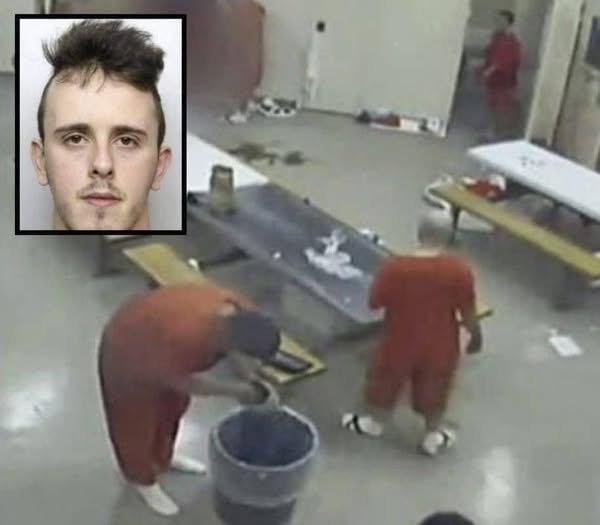😭 ‘Every time I touch it, I feel her heartbeat’ Iryna’s Boyfriend whispers, clutching the broken chain of the necklace that survived the blast, a fragile talisman of a love stronger than death.
In the quiet corners of a war-torn world, where the clamor of conflict often drowns out the whispers of the heart, stories of love persist like stubborn flames against a relentless storm.
This is the tale of Iryna Zarutska, a vibrant soul whose life was cruelly cut short by the very violence that has scarred her homeland, and her boyfriend, Oleksandr “Sasha” Kovalenko, a man whose grief has not dimmed the fire of their bond but rather kindled it into an eternal glow.
At the center of this narrative lies a simple object—a delicate silver necklace etched with intertwined hearts—that Sasha carries everywhere, a talisman of what was and what endures. “It makes me feel she’s still here,” he says softly, his voice cracking like fragile ice under the weight of memory.
This is the story of love that refuses to fade, a poignant reminder that even in the shadow of loss, the human spirit clings to threads of connection, weaving them into tapestries of hope and resilience.
To understand the depth of this love, one must first step back into the sunlit days before darkness descended. Iryna Zarutska was born on a crisp autumn morning in 1998 in the small village of Berezivka, nestled in the rolling hills of central Ukraine. Her childhood was a mosaic of simple joys: chasing fireflies through golden wheat fields, helping her grandmother harvest wild berries under a canopy of ancient oaks, and losing herself in the folk tales her father spun by the hearth. From an early age, Iryna exhibited a rare spark—a blend of unyielding curiosity and boundless empathy that drew people to her like moths to a lantern. “She had this laugh,” her older sister, Natalia, recalls, her eyes misting over as we sit in the family’s modest kitchen, the scent of fresh-baked bread mingling with the faint aroma of lavender from Iryna’s favorite soap. “It wasn’t just a sound; it was a melody that could chase away the gloomiest clouds. Even as a girl, she dreamed big—of becoming a teacher, of traveling the world, of building a life filled with light.”
Iryna’s path led her to Kyiv in 2016, where she enrolled at Taras Shevchenko National University to study literature. The city, with its baroque spires and bustling boulevards, became her canvas. She thrived amid the intellectual fervor of campus life, organizing poetry readings in hidden cafes and volunteering at local shelters for displaced families even before the full-scale invasion erupted. It was here, in the autumn of 2019, that fate—or perhaps something more serendipitous—interwined her life with Sasha’s. Oleksandr Kovalenko, then 24, was a software engineer at a mid-sized tech firm in the Podil district, a lanky figure with tousled dark hair and eyes the color of the Dnipro River at dusk. Sasha had grown up in Lviv, a city of cobblestone streets and revolutionary spirit, where he learned to code on an old family computer while his parents navigated the uncertainties of post-Soviet life.
Their meeting was unremarkable on the surface, the stuff of rom-com clichés that hide profound truths. It happened at a mutual friend’s birthday party in a cramped apartment overlooking the golden domes of St. Sophia’s Cathedral. Iryna arrived late, her cheeks flushed from the metro ride, carrying a homemade apple strudel that filled the room with cinnamon warmth. Sasha, nursing a beer in the corner, was struck first by her voice—clear and animated as she debated the merits of Pushkin versus Shevchenko with a group of strangers. “I remember thinking, ‘Who is this woman who makes literature sound like adventure?’” Sasha tells me, his fingers absently tracing the necklace’s chain as we speak in a quiet park near Maidan Nezalezhnosti. He approached her with a line borrowed from one of her favorite poems: “In the soul of every poet, there’s a battlefield of stars.” She laughed—that legendary laugh—and countered with a verse of her own. By midnight, they were walking the rain-slicked streets, sharing dreams under streetlamps that flickered like hesitant stars.
What began as flirtation blossomed into a love as deep as Ukraine’s black soil and as resilient as its people. Sasha and Iryna were opposites in temperament yet perfectly complementary: she, the dreamer with a penchant for spontaneous road trips to the Carpathians; he, the planner who mapped out every hike with topographic precision. They spent weekends exploring Kyiv’s hidden gems—the labyrinthine Andriivskyi Descent, where artists hawked their wares, or the serene banks of the Dnipro, where they’d picnic with thermoses of herbal tea and volumes of Taras Shevchenko’s verses. Iryna taught Sasha to see beauty in the ephemeral: the way frost etched patterns on windowpanes like nature’s calligraphy, or how a single sunflower could defy the wind. In return, he grounded her flights of fancy, building a simple app that digitized her poetry notebooks so her words could live forever in the cloud.
Intimacy deepened their bond. Their first kiss came on a snowy December evening in 2019, atop the funicular that climbs from Podil to Upper Town. As the city lights twinkled below like a sea of fallen stars, Sasha pulled Iryna close, their breaths mingling in the chill air. “It felt like coming home,” he says, a faint smile ghosting his lips. Their relationship was marked by quiet rituals: Friday nights cooking varenyky together, her hands dusted with flour as she pinched the dough, his focused on perfecting the cherry filling; lazy Sundays in bed, reading aloud from “The Master and Margarita,” debating Bulgakov’s devils with the fervor of scholars. Friends envied their ease, the way they anticipated each other’s silences, filling them with understanding rather than words.
The necklace entered their story in the spring of 2021, a gift that would later become Sasha’s lifeline. Iryna had always adored jewelry—not the ostentatious kind, but pieces with soul. On a whim during a weekend in Odesa, they wandered into a seaside artisan’s shop, where an elderly silversmith displayed his wares on velvet trays. Among them was a pendant: two silver hearts, one slightly larger than the other, intertwined in an eternal knot, engraved on the back with the Ukrainian proverb “Любов вічна”—”Love is eternal.” It wasn’t expensive, but to Iryna, it was priceless. “This is us,” she whispered to Sasha, holding it to the light where it caught the Black Sea’s gleam. He bought it on the spot, fastening it around her neck with trembling fingers. From that day, it rarely left her skin, a constant against her collarbone, warming to her pulse.
Psychologists might call it a coping mechanism, a psychological tether in the face of trauma. But for Sasha, it’s deeper—a spiritual communion. In Ukrainian folklore, which Iryna adored, objects hold souls; a loved one’s possession can carry their spirit, warding off evil and preserving bonds. The necklace embodies this: its intertwined hearts a symbol of their unbreakable union, the engraving a vow etched in eternity. Sasha began sharing its story informally, first with close friends, then at support groups for war widows and survivors. “It’s not about clinging to pain,” he explains, “but honoring the love that shaped me. Iryna taught me that loss doesn’t erase; it transforms.”


